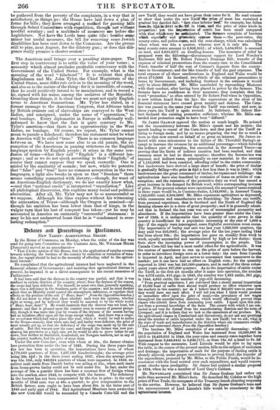The American mail brings over a puzzling state-paper. The first
step in controversy is to settle the value of your terms ; a necessity which almost precludes profitable controversy with the Government of the United States. For example, what is the meaning of the word " falsehood "? It is evident that plain Englishmen and Mr. John Tyler, the Chief Magistrate of the United States, must differ toto cal° as to the meaning of the word, and also as to the nature of the thing : for it is incredible of course, that he could positively intend to be mendacious, and to record a lie signed with his namet among the archives of the Republic. Granting these things, it Is clear that we must not apply Eneish terms to American transactions. Mr. Tyler has stated, m a former message to the American Congress, that Africans taken by British cruisers out of slave-ships are conveyed to the West Indies, and consigned, under the name of "apprentices," to real bondage. Every diplomatist in Europe is sufficiently well- informed to know that the fact is quite contrary to Mr. 'Tyler's assertion—that there is no apprenticeship in the West Indies, no bondage. Of course, we repeat, Mr. Tyler cannot mean to :parade a falsehood; therefore his statement must be what in America will be called "true." There is no common language between us. We have now some clue to an old puzzle, the as- sumption of the Americans in passing strictures on the English language spoken by English people : it arises in the same con- fusion of terms—what they call "English" is a different lan- guage; and as we do not speak according to their "English," of course they cannot suppose that we speak correctly. One is misled by the similarity of sounds ; but now, while we perceive that "false " and "true" have no common acceptation in the two languages, a light also breaks in upon us that "freedom" there means something connected with slavery,—though, for want of an American-English dictionary, we do not exactly know what, —and that "national credit" is interpreted " repudiation." Like all philological discoveries, this explains many social and political obscurities. After all, Mr. Tyler may not be so unsuccessful as we suppose. Although his time expires without his witnessbag the annexation of Texas—although the Oregon is unseized—al- though his ambition has been lower than that of kings, in the -vulgar turn that his lust of conquest has taken—yet he may be accounted in America an eminently " successful" statesman : it may be his not undeserved boast that he is "condemned to ever- lasting redemption."


























 Previous page
Previous page